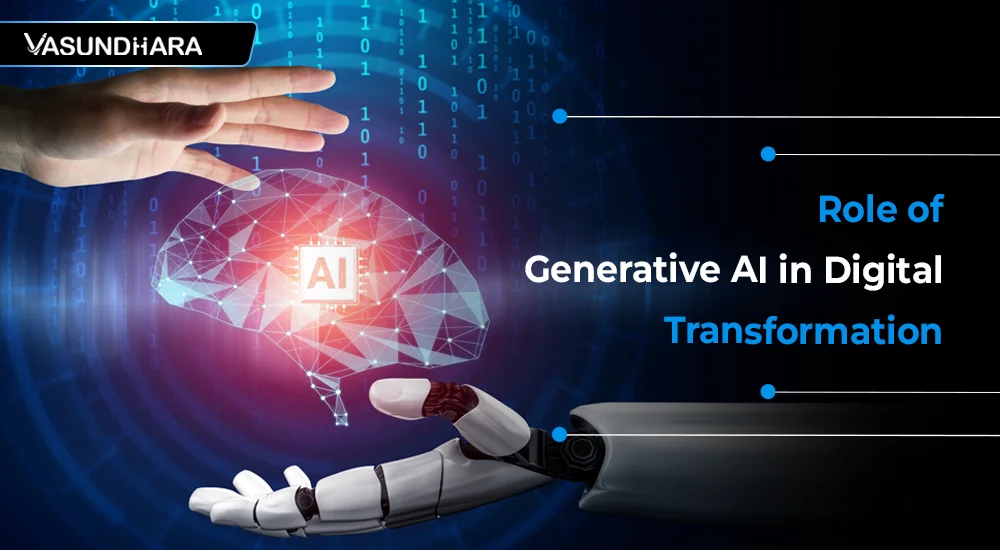Role of Generative AI in Digital Transformation


- Sep 27, 2024
In today’s fast-paced digital world, businesses are constantly striving to innovate, stay competitive, and meet the ever-growing demands of consumers. Digital transformation has become the key to achieving this, as it enables businesses to harness technology for improved efficiency, enhanced customer experiences, and new business models. A crucial part of this digital evolution is the advent of Generative AI—a subset of artificial intelligence (AI) that holds the potential to revolutionize industries through automation, creativity, and problem-solving capabilities.
In this blog, we will explore how Generative AI is playing a pivotal role in driving digital transformation across various industries, reshaping traditional workflows, and unlocking new opportunities. From personalized content creation and design automation to software development and beyond, the possibilities of AI digital transformation are vast.
Generative AI refers to AI models capable of creating new, original content, whether it be text, images, audio, code, or even 3D models. Unlike traditional AI models, which primarily perform analytical tasks based on pre-programmed rules or data inputs, generative AI can produce innovative outputs from scratch. It uses deep learning techniques, particularly generative adversarial networks (GANs) and transformers, to generate realistic data that mimics human-like creation. Some well-known examples include OpenAI’s GPT models, DALL-E, and ChatGPT.
While these models started out creating text-based responses or simple art, the current capabilities of generative AI go far beyond, enabling businesses to deploy it in diverse areas of operations and strategy.
Also read: How To Build An AI Software: A Comprehensive Guide
Automated Content Creation: Generative AI can produce high-quality, original content such as text, images, and videos. This is especially beneficial in marketing, media, and entertainment, reducing the need for manual effort in creating content while maintaining creativity.
By automating repetitive tasks like writing code, designing prototypes, or generating reports, generative AI frees up time for employees to focus on more strategic and creative endeavors, improving overall productivity.
Generative AI enables businesses to deliver hyper-personalized experiences to customers by analyzing data and generating tailored content, recommendations, or solutions in real-time.
Automation reduces the need for manual intervention, thereby cutting costs in areas such as content production, design, and development.
Generative AI unlocks new possibilities for innovation, allowing businesses to experiment with different ideas, concepts, and designs more rapidly.
With the ability to generate numerous solutions or models based on limited input, generative AI provides valuable insights for decision-making and helps solve complex problems.
Digital transformation refers to the integration of digital technologies into all areas of a business, fundamentally changing how organizations operate and deliver value to customers. It involves adopting tools like cloud computing, artificial intelligence, data analytics, and automation to streamline processes, enhance customer experiences, and drive innovation.
More than just implementing new technologies, digital transformation requires a shift in mindset and culture, encouraging businesses to rethink their strategies, customer engagement methods, and internal workflows. By embracing digital transformation, organizations can improve operational efficiency, adapt to market changes more effectively, and create new revenue opportunities, ultimately staying competitive in an increasingly digital-first world.
Also read: The Impact of Digital Transformation in Manufacturing Industry
Generative AI is revolutionizing digital transformation by automating and enhancing key business processes. Unlike traditional AI models that analyze data, generative AI creates new, original content, from text and images to code and designs. This capability is driving innovation across industries, enabling businesses to personalize customer experiences, streamline content creation, and automate software development.
For instance, in marketing, generative AI can generate targeted content, helping businesses deliver personalized campaigns at scale. In software development, tools like GitHub Copilot assist developers by suggesting code snippets, improving efficiency. Additionally, generative AI is transforming creative industries by automating tasks such as graphic design, product creation, and video production.
With artificial intelligence digital transformation strategies, businesses can accelerate innovation, improve operational efficiency, and stay competitive in a rapidly evolving digital landscape. The technology offers new ways to unlock growth, optimize workflows, and create customer-centric solutions.
Also read: How To Integrate AI Into An App
Generative AI is a game-changer in digital transformation, enabling businesses to rethink how they operate, create, and innovate. Unlike traditional AI, which analyzes data, generative AI creates new, original content, whether text, images, audio, code, or designs. Here’s how it's transforming digital transformation across industries.
The core of digital transformation in marketing and customer engagement revolves around delivering personalized experiences. Businesses can no longer rely on generic messaging and broad campaigns—they need to create hyper-relevant, personalized content that resonates with individual users. Generative AI can create personalized marketing content on a massive scale, whether for emails, product descriptions, blog posts, or advertisements.
By analyzing customer data, generative AI can:
For example, companies like Netflix and Amazon leverage AI to personalize recommendations for millions of users, dynamically adjusting to their tastes in real-time. By incorporating generative AI, the content creation process becomes faster and more scalable while improving user engagement.
Generative AI is making waves in creative industries, transforming how we approach design and content creation. Traditionally, creating designs or visuals has been labor-intensive, requiring human creativity. However, AI systems like DALL-E and MidJourney can generate complex, high-quality images based on simple textual prompts.
This is enabling businesses to automate parts of their design workflows, including:
This transformation helps businesses meet tight deadlines, save costs, and scale creative processes without compromising on quality.
One of the key areas where Generative AI is revolutionizing digital transformation is software development. Traditionally, coding is a highly manual, time-consuming process requiring skilled developers. However, with the introduction of AI tools like GitHub Copilot and OpenAI’s Codex, developers can now generate code faster and more accurately.
Generative AI can:
By automating tedious aspects of development, businesses can reduce costs, accelerate time-to-market, and maintain software quality, giving them a significant competitive advantage.
In customer service, AI-driven chatbots have already shown how automation can improve response times and provide 24/7 support. But generative AI takes this a step further by enabling more sophisticated and context-aware interactions with customers.
Generative AI can be used to create:
Generative AI-powered customer service platforms can handle large volumes of inquiries, resolve customer issues faster, and provide personalized support at scale.
Data plays a crucial role in digital transformation. However, businesses often struggle with incomplete, biased, or insufficient data to train their AI models or make informed decisions. Generative AI can help solve this problem through data augmentation.
Generative AI can:
In sectors such as healthcare, manufacturing, and finance, where data accuracy and volume are critical, Generative AI’s ability to augment and enhance data streams can greatly improve decision-making and predictive capabilities.
Generative AI is also making significant contributions to healthcare, particularly in the areas of drug discovery and diagnostics. Traditional drug discovery processes can take years of research and significant financial investment. Generative AI models can significantly speed up this process by simulating molecular combinations and generating viable drug candidates faster.
For instance:
By integrating AI into medical research and clinical diagnostics, healthcare providers can improve patient outcomes while reducing costs.
Manufacturers and supply chain managers are leveraging generative AI to optimize production processes, forecast demand, and automate supply chain operations. AI can create models that simulate various manufacturing scenarios, allowing companies to test different production processes and identify the most efficient ones.
Generative AI enables:
By incorporating generative AI, manufacturing companies can reduce costs, minimize waste, and increase overall efficiency.
Despite the numerous benefits, implementing generative AI as part of digital transformation also comes with challenges. Businesses need to carefully consider the following factors:
As AI models rely on vast amounts of data, ensuring that sensitive information is protected is crucial.
AI models can perpetuate biases present in their training data, leading to inaccurate or unfair outcomes.
The ability to generate fake but realistic content, such as deepfakes, raises ethical questions regarding AI’s misuse.
Training large AI models requires significant computational resources, which can be costly for smaller businesses.
While AI can automate many processes, human oversight is still necessary to ensure that AI systems are producing accurate, responsible, and ethical outputs.
Generative AI is playing a vital role in driving digital transformation across industries. From automating creative processes and enhancing customer engagement to optimizing software development and revolutionizing healthcare, the potential of generative AI is far-reaching. However, businesses must be mindful of the challenges associated with this technology, including ethical considerations, data privacy, and resource demands.
For organizations embarking on their digital transformation journey, embracing generative AI can unlock new growth opportunities, foster innovation, and enable more agile, efficient operations. Whether it’s through improving customer experiences, automating content creation, or streamlining operations, the applications of generative AI are vast and will continue to expand as the technology matures.
At Vasundhara Infotech, we are a leading AI development company that provides comprehensive digital transformation services tailored to your business needs. Whether you're looking to streamline operations, enhance customer experiences, or leverage the latest AI technologies, our team of experts guides you every step of the way.
Contact us today to learn how we can help you harness cutting-edge solutions and take your business to the next level. Let's build the future together!
Copyright © 2026 Vasundhara Infotech. All Rights Reserved.
